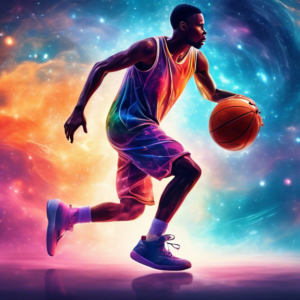In the electrifying world of basketball, where every second counts, raw athleticism alone won’t cut it. While physical attributes like strength and agility are undoubtedly crucial, the mental game often emerges as the key differentiator between good and great players. This rings especially true when it comes to speed, a multifaceted aspect of basketball prowess that extends far beyond just sprinting ability.
Beyond Physical Limits: The Mind’s Influence on Basketball Speed
When we talk about basketball speed, it’s crucial to understand that we’re not just referring to how fast a player can run in a straight line. It encompasses a much broader spectrum:
- Physical Speed: This is the traditional notion of speed – how quickly a player can cover ground. It includes sprinting, backpedaling, lateral movement, and overall court coverage.
- Decision-Making Speed: This refers to how quickly a player can process information on the court, analyze situations, and make effective decisions. It’s about reacting to the defense, anticipating plays, and choosing the optimal action in a split second.
- Anticipation: This goes hand-in-hand with decision-making. Players who can anticipate their opponents’ moves, the trajectory of the ball, or the flow of the game possess a distinct speed advantage. They’re a step ahead, both mentally and physically.
- Focus and Concentration: In the heat of competition, maintaining unwavering focus is crucial for optimal speed. Distractions can lead to delayed reactions, missed opportunities, and a general decline in cognitive processing speed.
The Psychology of Speed: How the Mind Dictates Pace
The human brain acts as the central command center for all things speed-related in basketball. Here’s a deeper look at the psychological factors that come into play:
1. Information Processing and Reaction Time:
The game of basketball is a constant influx of sensory information. Players are bombarded with visual cues (the movement of opponents, the ball’s trajectory), auditory cues (the squeak of shoes, the coach’s instructions), and even tactile cues (the feel of the ball, contact from defenders). The brain must rapidly process all of this information to make split-second decisions.
Players with exceptional court vision and spatial awareness excel at this information processing. They can quickly assess passing lanes, anticipate defensive rotations, and exploit openings that others might miss. This mental agility translates into a significant speed advantage, allowing them to react faster and make game-changing plays.
2. The Power of Anticipation: Playing Chess at High Speed
Elite basketball players often describe the game as slowing down for them. This isn’t a matter of actual time dilation but rather a testament to their exceptional anticipation skills. By studying their opponents, understanding playbooks, and recognizing patterns, these players develop an almost intuitive sense of what’s going to happen next.
This ability to anticipate actions gives them a split-second advantage. They can start their movements before others, position themselves for steals or rebounds, and react to passes that haven’t even been thrown yet. In essence, they’re playing the game a step ahead, both mentally and physically.
3. Confidence: The Mental Fuel for Explosive Plays
Confidence is an often-overlooked but crucial element of basketball speed. Players who trust their abilities, instincts, and preparation are more likely to take risks, make quick decisions, and execute plays at high speed.
Conversely, a lack of confidence can lead to hesitation, indecisiveness, and a general slowing down of both physical and mental processes. Doubt can creep into a player’s mind, causing them to second-guess their instincts and ultimately hindering their speed on the court.
Training the Mind for Speed: Techniques for Mental Agility
Just like physical speed, mental quickness can be developed and enhanced through targeted training. Here are some techniques that players can incorporate into their regimens:
1. Visualization and Mental Rehearsal:
Visualizing game situations and mentally rehearsing actions can significantly improve reaction time and decision-making. By vividly imagining themselves on the court, players can train their brains to process information faster and make quicker decisions. This mental practice helps create a sense of familiarity, allowing them to react more instinctively during actual games.
2. Film Study and Pattern Recognition:
Dedicating time to film study is crucial for developing anticipatory skills. By analyzing opponents’ tendencies, team strategies, and recurring game scenarios, players can start to recognize patterns and anticipate actions. This proactive approach gives them a valuable speed advantage, allowing them to react quicker and make more informed decisions.
3. Mindfulness and Focus Training:
In the high-pressure environment of a basketball game, maintaining focus is paramount. Techniques like meditation and mindfulness exercises can help players train their minds to stay present, block out distractions, and concentrate on the task at hand. This heightened focus translates into sharper reactions, improved decision-making, and an overall increase in mental speed.
4. Playing with Pace: Controlled Aggression
Speed in basketball isn’t just about reckless abandon. It’s about controlled aggression, knowing when to push the tempo and when to exercise patience. Players who can effectively control the game’s pace, dictating the flow with their decision-making and execution, often hold a significant advantage.
Conclusion: The Mental Edge in Basketball
In the dynamic world of basketball, where milliseconds can make the difference between victory and defeat, the mental aspects of speed reign supreme. It’s not just about how fast a player can run but how quickly they can think, react, and anticipate. By embracing the power of visualization, film study, mindfulness, and confidence-building, players can unlock a new level of speed that extends far beyond physical limitations.
